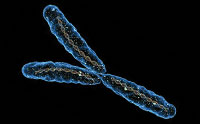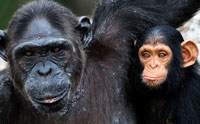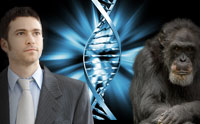Could they really have developed at random in two completely different environments?
Zoology
Are Humans as Close to Chickens as They Are to Chimps?
 A recent comprehensive analysis compared the human Y chromosome with the chimpanzee Y chromosome, and the researchers found that they were “remarkably divergent.”
A recent comprehensive analysis compared the human Y chromosome with the chimpanzee Y chromosome, and the researchers found that they were “remarkably divergent.”
Most of their findings do not fit well with the often-repeated erroneous statement that humans and chimps are 98 percent similar, nor with the more general hypothesis that they share a common ancestor. More...
Chimp DNA Mutation Study—Selective Yet Surprising
 A popular evolutionary belief is that humans and chimps shared a common ancestor 2 to 6 million years ago. Apparently, evolutionists still aren't too sure of their own theory: now they've more than doubled that timeline. More...
A popular evolutionary belief is that humans and chimps shared a common ancestor 2 to 6 million years ago. Apparently, evolutionists still aren't too sure of their own theory: now they've more than doubled that timeline. More...
Chromosome Comparison Shows More Chimp-Human Differences

Since the original 2005 chimpanzee genome report, researchers obtained and made available for public use additional chimpanzee DNA sequences, courtesy of federal tax dollars.1 However, this new chimpanzee DNA sequence is somewhat flawed—it is not represented on its own merit because researchers assembled the chimp genome’s sequence fragments based on the human genome framework.2, 3 More...
Evaluating the Human-Chimp DNA Myth--New Research Data

A recent presentation at the 2011 Creation Biology Society (CBS) meetings has stirred the pot once again on the human-chimp DNA similarity issue among creationists, intelligent design proponents, and some evolutionists.1 It was reported that a query of 40,000 chimp genomic DNA sequences against the most recent assembly of the human genome provided an average similarity estimate of 97 to 98 percent. More...
First Phase Complete in Human and Chimp Genome-Wide DNA Comparison

The ICR life sciences team has been conducting a large-scale comparison project of human versus chimp DNA sequence, the first phase of which has now been completed. The research involved the use of 40,000 purportedly random chimpanzee DNA sequences obtained from the National Center for Biotechnology that were produced as part of the chimpanzee genome project. More...
Genetic Recombination Study Defies Human-Chimp Evolution
 Results from a recent study in human and chimpanzee genetics have shipwrecked yet another Darwinian hypothesis. More...
Results from a recent study in human and chimpanzee genetics have shipwrecked yet another Darwinian hypothesis. More...
Human lincRNA Regions Vastly Different from Chimpanzee

It was once thought that the areas between protein-coding genes located around the genome were vast purposeless wastelands of alleged “junk DNA.” However, we now know that these previously misunderstood regions are literally teeming with functional activity that is key to life. More...
Human-Chimp Genetic Similarity: Is the Evolutionary Dogma Valid?

One of the major missions in ICR’s current research emphasis is to scientifically challenge the evolutionary tree of life as a valid biological paradigm.1 A common manifestation of this evolutionary dogma is the claim that humans are 95 to 99 percent genetically identical to chimpanzees. More...
Human-Chimp Genetic Similarity: Refuting the Appeal to Human Genetic Testing

A current research emphasis of the ICR life sciences team is the “tree of life,†a standard icon of the evolutionary paradigm.1 Evolutionists commonly try to buttress their claim of a universal tree of life by pointing to the genetic similarity between chimpanzees and humans.
Evolutionists make several major claims in this regard: More...
Human-Chimp Similarities: Common Ancestry or Flawed Research?

In 2003, the human genome was heralded as a near-complete DNA sequence, except for the repetitive regions that could not be resolved due to the limitations of the prevailing DNA sequencing technologies.1 The chimpanzee genome was subsequently finished in 2005 with the hope that its completion would provide clear-cut DNA similarity evidence for an ape-human common ancestry. More...
New Chromosome Research Undermines Human-Chimp Similarity Claims

A recent high-profile article in the journal Nature released the results of a study with implications that shocked the scientific community because they contradict long-held claims of human-chimp DNA similarity. More...
New Human-Chimp Chromosome 2 Data Challenge Common Ancestry Claims

One of the leading arguments used to support the concept that apes—particularly chimpanzees—and humans descended from a common ancestor is the “chromosome 2 fusion model.” This scenario involves the claim that the end-to-end fusion of two small chimpanzee-like chromosomes (now called 2A and 2B in chimpanzees) formed one stable large chromosome in humans (chromosome 2). More...








































































































































































